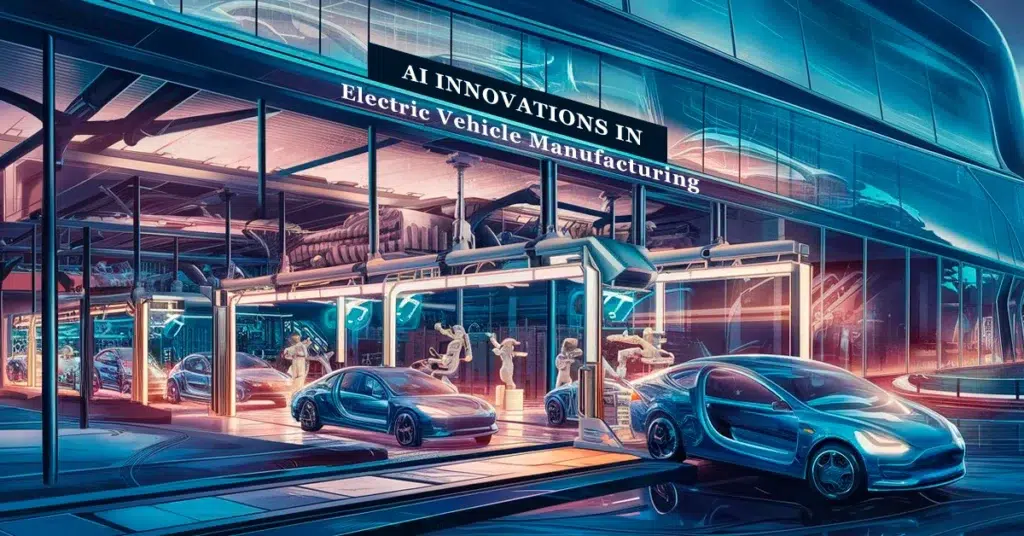
The surge in electric vehicles (EVs) marks a pivotal shift in automotive manufacturing towards sustainable transportation. AI innovations in EV manufacturing stands at the forefront of modern manufacturing, revolutionising the EV industry. Cutting-edge AI technologies like machine learning and deep learning are reshaping EV production processes. This blog delves into the profound impact of AI in EV manufacturing on enhancing efficiency, quality control, customization, energy management, safety protocols, and workforce dynamics, with a particular focus on advanced battery technologies.
Introduction to Electric Mobility
Electric mobility refers to the use of electric vehicles (EVs) as a mode of transportation, which has gained significant attention in recent years due to its potential to reduce greenhouse gas emissions and improve energy efficiency. This shift is crucial in addressing environmental challenges, particularly in decreasing fossil fuels and reducing greenhouse gas emissions.
The increasing demand for EVs has led to the development of advanced electric vehicle technology, including battery technology, autonomous driving, and intelligent energy management systems. Artificial intelligence (AI) plays a crucial role in electric mobility, enabling the optimization of energy consumption, vehicle performance, and energy management.
The shift towards electric mobility is driven by the need for sustainable transportation solutions. Electric vehicles, powered by advanced battery technology, offer a cleaner alternative to traditional internal combustion engine vehicles. The integration of AI in electric vehicle technology has further accelerated this transition, providing innovative solutions to enhance the efficiency and performance of EVs.
AI-driven intelligent energy management systems are at the heart of electric mobility, optimizing energy usage and reducing energy waste. These systems analyze vast amounts of data from various sources, including sensors, GPS, and weather forecasts, to predict energy requirements and optimize energy consumption. This not only improves the overall efficiency of electric vehicles but also extends their range and lifespan.
Moreover, AI plays a pivotal role in autonomous driving, enabling self-driving EVs to navigate through complex traffic scenarios with ease. AI-powered advanced driver assistance systems (ADAS) enhance road safety by providing real-time assistance to drivers, reducing the risk of accidents and improving the overall driving experience.
In summary, electric mobility represents a significant leap towards a sustainable future, with AI playing a crucial role in optimizing energy efficiency, vehicle performance, and energy management. The advancements in electric vehicle technology, driven by AI, are paving the way for a cleaner, greener, and more efficient transportation system.
Definition of AI in Electric Vehicle Manufacturing
Artificial intelligence (AI) in electric vehicle manufacturing leverages machine learning algorithms and data analytics to enhance EV design, production, and performance. By optimizing battery technology, high voltage components, electric motor design, and energy management systems, AI improves the efficiency and reliability of electric vehicles.
Machine learning analyzes vast data to refine production processes, ensuring electric motors deliver peak performance while minimizing energy consumption. AI significantly impacts battery technology by predicting degradation and optimizing charging cycles, thus extending battery lifespan and safety. Energy management systems benefit from real-time AI data analysis, optimizing energy usage based on driving conditions and renewable energy sources.
AI-driven predictive maintenance transforms EV manufacturing by anticipating issues before they occur, enhancing vehicle reliability and performance. By analyzing sensor data, AI predicts maintenance needs, reducing downtime and improving overall EV performance. This integration of AI-driven technologies is revolutionizing traditional production processes, leading to more efficient and high-performing electric vehicles.
AI’s role in electric vehicle manufacturing extends beyond production, encompassing battery optimization and predictive maintenance to transform the EV industry into a more efficient and reliable sector.
Importance of AI in Electric Mobility
AI is crucial in electric mobility, optimizing energy consumption, vehicle performance, and energy management. AI-powered systems analyze data from sensors, GPS, and weather forecasts to predict energy needs and optimize usage. AI also plays a crucial role in optimizing charging systems, ensuring efficient energy use and reducing downtime for electric vehicles. In autonomous driving, AI enables self-driving EVs to navigate complex traffic and improve safety.
AI-driven advanced driver assistance systems (ADAS) enhance driving by providing real-time assistance, reducing accident risks. Energy consumption optimization is a key benefit, with AI algorithms adjusting energy usage for peak efficiency, reducing waste, and extending vehicle range. Intelligent energy management systems powered by AI also optimize renewable energy use, enhancing EV sustainability.
In autonomous driving, AI processes data from sensors and cameras, allowing self-driving EVs to navigate traffic with precision. AI systems make real-time decisions, improving safety and efficiency. AI-powered ADAS provide real-time driver assistance, enhancing safety and comfort. These systems analyze sensor and camera data for timely alerts, reducing accident risks.
AI is a critical component of electric mobility, transforming the EV industry with technologies in autonomous driving and ADAS, leading to safer, efficient, and high-performing electric vehicles.
Enhancing Production Efficiency

When it comes to AI in EV manufacturing, the focus is on streamlining processes for optimal efficiency. The implementation of flexible production lines allows manufacturers to adapt quickly to changes in design and demand, enhancing overall production efficiency.
Let’s explore how this cutting-edge technology is transforming the production landscape. The integration of AI with advanced battery technologies is crucial for optimizing performance, extending lifespan, and enhancing safety of electric vehicles.
AI-Driven Automation
In the realm of ASSEMBLY, robotics takes centre stage, revolutionising the traditional production line. With precision and speed, robotic arms meticulously piece together components, ensuring seamless integration.
For predictive maintenance, machine learning algorithms analyse data to anticipate potential issues before they arise. By predicting maintenance needs in advance, downtime is minimised, keeping operations running smoothly. Additionally, AI-driven automation plays a significant role in the development and optimization of advanced battery technologies, ensuring better performance and safety.
Supply Chain Optimization
Real-time inventory management is a game-changer for manufacturers. Through constant monitoring and data analysis, stock levels are optimised, reducing excess inventory and minimising shortages.
Demand forecasting leverages AI capabilities to predict market trends accurately. By analysing historical data and external factors, manufacturers can adjust production schedules accordingly to meet consumer demand.
Electric Vehicle Production and Assembly
Electric vehicle production and assembly involve a unique set of manufacturing processes that differ significantly from traditional vehicle production. EV manufacturers must consider the specific requirements of electric motors, battery packs, and power electronics when designing and assembling their vehicles. These components are crucial for the performance and efficiency of electric vehicles, making their integration a top priority.
The production process for EVs typically involves a combination of automated and manual assembly techniques to ensure optimal efficiency and quality control. Advanced technologies, such as robotics and computer-aided design (CAD), are increasingly common in EV production and assembly. Robotic arms, for instance, are used to piece together various components with precision and speed, ensuring seamless integration and high-quality standards.
EV manufacturers often invest in their own manufacturing facilities to maintain control over the production process and ensure that their vehicles meet the highest standards of quality and performance. Owning manufacturing facilities allows manufacturers to implement stringent quality control measures, ensuring that every vehicle produced meets the required safety and performance criteria.
Supply chain optimization is another critical aspect of EV production. Manufacturers must ensure that components, such as lithium-ion batteries, are sourced efficiently and effectively. This involves real-time inventory management and demand forecasting to minimize shortages and reduce excess inventory.
The production process for EVs is often more complex than that of traditional vehicles due to the need to integrate advanced technologies and components. This complexity necessitates a focus on quality control measures to ensure that the final product meets the highest standards of safety and performance. By prioritizing these measures, EV manufacturers can produce high-quality vehicles that meet the evolving needs of consumers.
Inspection, Quality Control and Assurance
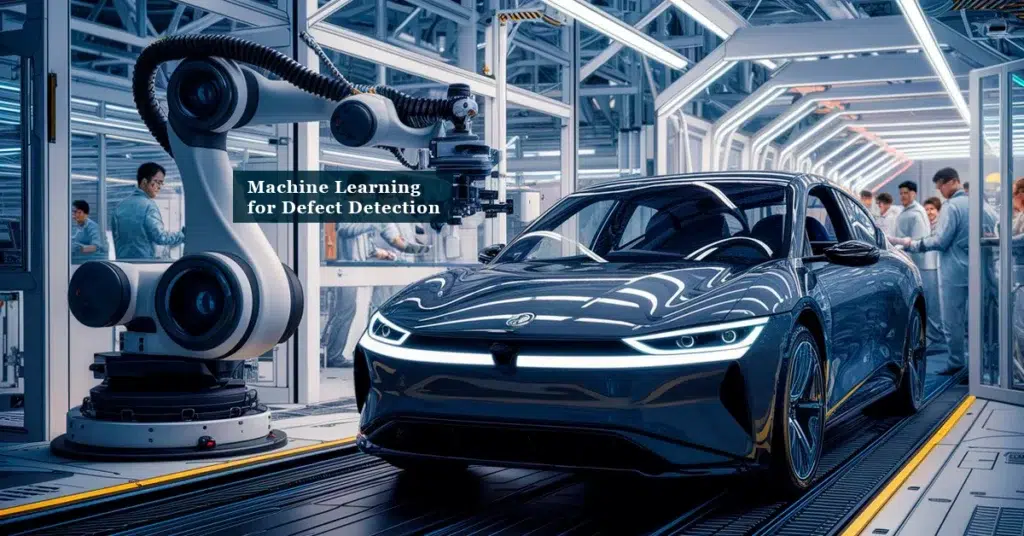
In the automotive industry, inspection, quality control, and assurance are critical processes that ensure the safety and reliability of vehicles. Quality control measures are particularly crucial for components like the battery pack, ensuring they meet performance and safety standards. These processes involve a series of checks and balances that detect defects and inconsistencies in the manufacturing process.
Machine Learning for Defect Detection
In the realm of defect detection, machine learning algorithms are the driving force behind identifying imperfections in EV components. These sophisticated systems utilise advanced data analysis to pinpoint flaws with precision.
Visual Inspection Systems
Visual inspection systems play a crucial role in detecting surface irregularities and structural defects within electric vehicles. By employing high-resolution cameras and AI algorithms, manufacturers ensure impeccable quality standards.
Anomaly Detection Algorithms
Anomaly detection algorithms serve as vigilant watchdogs, identifying any deviations from the norm during the manufacturing process. Through continuous monitoring and analysis, these algorithms enhance quality control measures significantly. These algorithms are also crucial in monitoring advanced battery technologies, ensuring that any deviations in battery performance are detected and addressed promptly.
Predictive Maintenance and Data Analytics for Process Improvement
Data analytics is instrumental in refining the EV manufacturing process to achieve optimal efficiency and quality standards. By analysing production data, manufacturers can identify areas for improvement and implement targeted enhancements.
Statistical Process Control
Statistical process control enables manufacturers to maintain consistency in production by monitoring key parameters and detecting variations promptly. This proactive approach ensures that each electric vehicle meets stringent quality criteria.
Root Cause Analysis
Root cause analysis delves deep into identifying the underlying reasons for defects or inefficiencies in the manufacturing process. By addressing root causes effectively, manufacturers can implement lasting solutions to enhance overall product quality.
Customization and Personalization
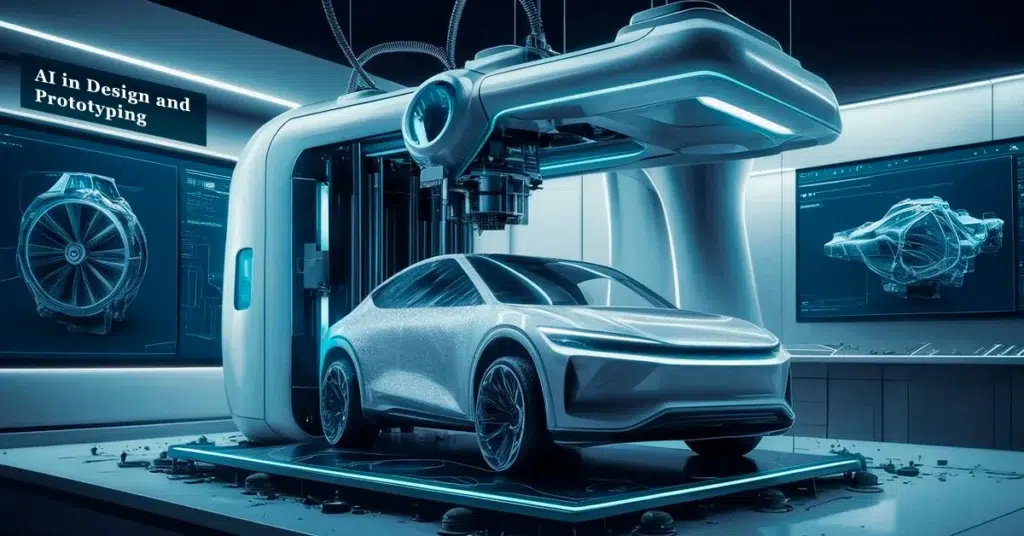
Customization and personalization are at the forefront of electric vehicle technology. AI-driven technologies enable engineers and designers to collaborate and create innovative concepts that enhance both performance and aesthetics. This allows for the development of unique and efficient designs tailored to individual preferences.
AI in Design and Prototyping
In the realm of design and prototyping, AI-driven technologies are reshaping the landscape of customization and personalization for EVs. The integration of generative design algorithms allows for innovative and efficient creation of vehicle components, optimising both performance and aesthetics.
Generative Design
The utilisation of generative design empowers manufacturers to explore a myriad of design possibilities based on specified parameters. This iterative process results in unique solutions that enhance the overall functionality and appeal of electric vehicles.
Virtual Prototyping
Virtual prototyping revolutionises the traditional design validation process by simulating real-world scenarios in a digital environment. Through virtual testing, manufacturers can identify potential issues early on, leading to cost savings and accelerated development timelines.
Customer Preferences and Feedback
Understanding customer preferences is paramount in delivering personalised experiences with electric vehicles. By leveraging sentiment analysis, manufacturers gain valuable insights into consumer perceptions, allowing for tailored product offerings that resonate with target audiences.
Sentiment Analysis
Sentiment analysis tools analyse customer feedback from various sources to gauge satisfaction levels and sentiment towards electric vehicles. This data-driven approach enables manufacturers to adapt their strategies based on real-time feedback, fostering stronger customer relationships.
Adaptive Manufacturing
Adaptive manufacturing integrates customer feedback directly into the production process, enabling dynamic adjustments to meet evolving demands. By incorporating adaptive manufacturing practices, manufacturers can swiftly respond to market trends and deliver customised electric vehicles that align with consumer expectations.
Energy Efficiency, Management and Sustainability
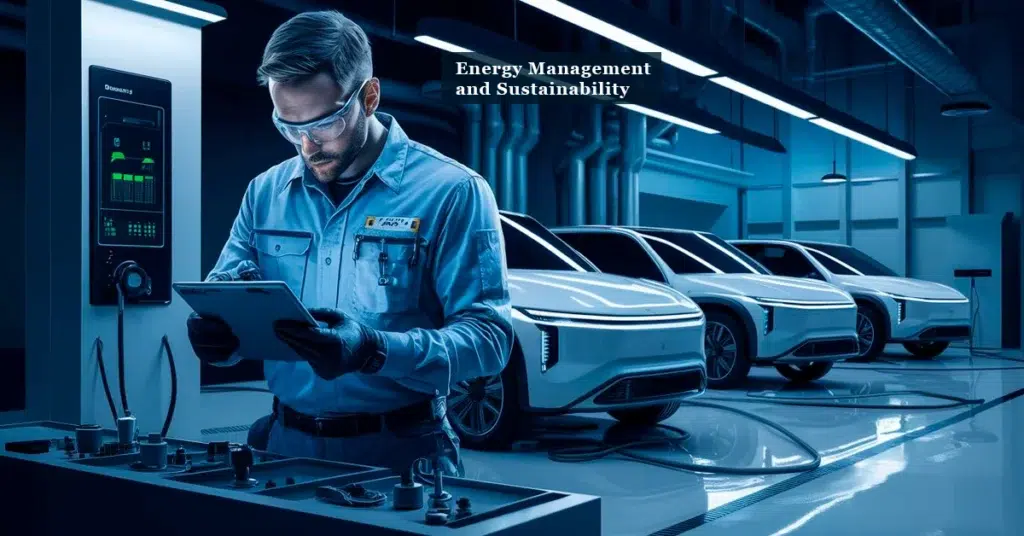
In the realm of AI for battery management systems, predictive battery health monitoring is a game-changer for ensuring optimal performance and longevity of electric vehicles. Advancements in battery technology, particularly in increasing energy density, play a crucial role in enhancing the performance and efficiency of electric vehicles. By analysing data patterns and usage trends, manufacturers can anticipate maintenance needs proactively, maximising battery efficiency.
AI’s role in optimizing advanced battery technologies is pivotal for enhancing the energy efficiency and sustainability of electric vehicles.
Energy optimization algorithms further enhance the sustainability of electric vehicles by intelligently managing power consumption. These sophisticated algorithms adjust energy distribution based on driving conditions, optimising the vehicle’s overall performance while minimising environmental impact.
Sustainable Manufacturing Practices
Waste reduction techniques are pivotal in promoting eco-friendly manufacturing processes within the electric vehicle industry. By implementing efficient waste management strategies and recycling initiatives, manufacturers can minimise environmental footprint and contribute to a greener future.
Energy-efficient production methods prioritise resource conservation and sustainability in EV manufacturing. Through the adoption of energy-efficient technologies and practices, manufacturers reduce carbon emissions and energy consumption during production, aligning with global efforts towards a more sustainable automotive industry.
AI-Powered Charging Infrastructure
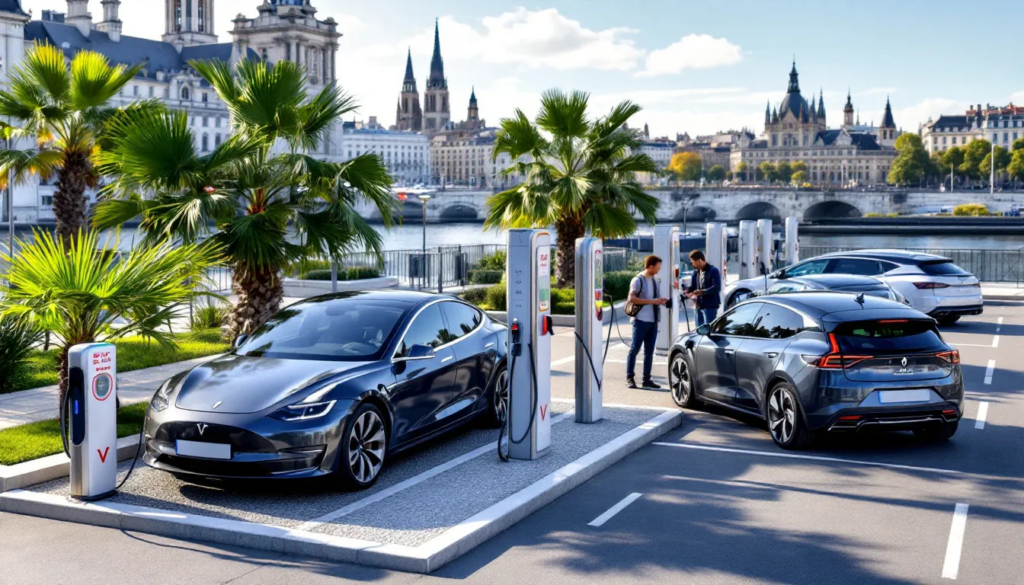
AI-powered charging infrastructure is revolutionizing electric mobility by optimizing the charging of electric vehicles. The integration of new and better technologies in charging infrastructure is essential for meeting the growing energy demands of electric vehicles. By analyzing data from energy demand, grid capacity, and weather forecasts, AI algorithms predict energy requirements and optimize charging schedules.
This not only reduces energy waste but also minimizes grid strain, enhancing the efficiency of the charging process. Additionally, AI enables vehicle-to-grid (V2G) technology, allowing EVs to supply energy back to the grid during peak demand periods, stabilizing the energy supply and offering additional revenue streams for EV owners. Energy storage systems are also optimized through AI, ensuring efficient energy use and reducing waste, while predictive maintenance enhances reliability by scheduling proactive maintenance.
The integration of AI into charging infrastructure transforms EV charging solutions, making them more efficient, reliable, and sustainable. AI algorithms analyze real-time data to optimize charging times, reducing costs and environmental impact. AI-powered systems enable V2G technology, where EVs contribute to grid stability, and optimize energy storage systems to improve overall energy efficiency.
By predicting potential issues and scheduling maintenance, AI ensures continuous operation and enhances the sustainability of electric mobility. This technological advancement is reshaping the EV industry, providing smarter, greener, and more efficient charging solutions.
Improving Battery Technology with AI
Artificial intelligence (AI) is revolutionizing battery technology by optimizing performance, lifespan, and safety. Technological advancements in AI are driving significant improvements in battery performance, lifespan, and safety. Through data analysis from various sources like battery health and state of charge, AI predicts degradation and optimizes charging cycles. AI-powered battery management systems (BMS) enhance energy storage efficiency, reducing waste and improving energy usage.
These systems make real-time adjustments to ensure batteries operate efficiently and safely. Predictive maintenance, driven by AI, detects potential battery faults early, allowing for proactive maintenance that minimizes downtime and enhances reliability. AI’s integration in battery technology significantly boosts electric vehicle performance.
Real-time data analysis allows AI algorithms to predict battery degradation, ensuring peak efficiency and extended lifespan. This transformation is spearheaded by AI-powered BMS, which optimize energy storage and usage. By analyzing data, these systems adjust in real-time to maximize efficiency and safety. Predictive maintenance further enhances battery reliability by identifying faults before they occur, ensuring continuous peak performance and safety for electric vehicles.
Enhancing Safety and Compliance
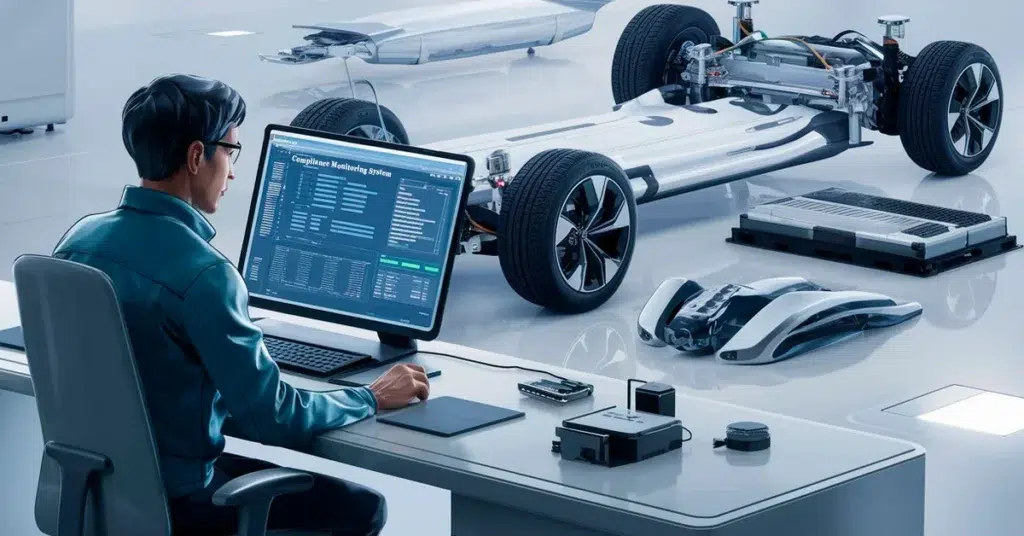
In addition to enhancing safety, electric vehicles also contribute to reducing noise pollution, making urban environments more livable.
AI in Safety Protocols
In ensuring safety within electric vehicle manufacturing, AI-driven technologies play a pivotal role. Real-time hazard detection systems utilise advanced algorithms to identify potential risks instantly, enhancing workplace safety for all employees. AI-driven technologies also enhance the safety of advanced battery technologies by monitoring and predicting potential risks.
Automated safety audits streamline compliance processes by automating routine inspections and assessments. By leveraging AI capabilities, manufacturers can conduct thorough safety audits efficiently, ensuring adherence to industry regulations and standards.
Regulatory Compliance
Compliance monitoring systems are essential tools for maintaining regulatory standards in electric vehicle manufacturing. These systems track and analyse operational data to ensure that all processes align with legal requirements and industry guidelines.
Documentation and reporting automation simplifies compliance procedures by automating the generation of reports and documentation. Through AI integration, manufacturers can streamline compliance tasks, reducing manual errors and ensuring accurate record-keeping.
Workforce Transformation

Workforce transformation is crucial in the evolving landscape of the EV industry. Many EV startups are leveraging AI-driven technologies to train their workforce and bridge skill gaps effectively. By integrating advanced training programs, companies can ensure their employees are well-equipped to handle new technologies and processes. This not only improves efficiency but also enhances the overall quality of the products being developed.
AI in Workforce Training
Incorporating AI-driven technologies into workforce training revolutionises skill development and knowledge acquisition. Virtual Reality Training Modules offer immersive learning experiences, simulating real-world scenarios to enhance practical skills effectively.
Skill Gap Analysis, powered by AI, identifies areas for improvement within the workforce. By analysing performance data, organisations can tailor training programs to address specific skill gaps and optimise overall proficiency levels.
Human-Machine Collaboration
The synergy between humans and machines is exemplified through Collaborative Robots (Cobots), where automation complements human capabilities. These intelligent robots work alongside employees, enhancing productivity and efficiency in manufacturing processes.
Augmented Reality for Maintenance introduces innovative ways to streamline maintenance tasks. By overlaying digital information onto physical environments, technicians can access real-time data and instructions, improving maintenance accuracy and speed.
Digital Transformation in Electric Vehicle Manufacturing
The digital transformation of electric vehicle manufacturing is driving innovation and efficiency in the industry. EV manufacturers are leveraging advanced technologies, such as artificial intelligence (AI) and the Internet of Things (IoT), to optimize their production processes and improve vehicle performance. These technologies enable manufacturers to analyze vast amounts of data, identify areas for improvement, and implement targeted enhancements.
One of the key advancements in digital transformation is the use of digital twins. Digital twins are virtual replicas of physical vehicles that simulate and test various components and systems. This reduces the need for physical prototypes and improves the overall efficiency of the development process. By using digital twins, manufacturers can identify potential issues early on, leading to cost savings and accelerated development timelines.
Data analytics and machine learning are also becoming increasingly common in EV manufacturing. These technologies enable manufacturers to analyze production data, identify inefficiencies, and optimize their production processes. By leveraging data-driven insights, manufacturers can enhance the quality and performance of their vehicles.
EV manufacturers are also investing in digital tools and platforms to enhance collaboration and communication between different teams and stakeholders. This improves the overall efficiency and effectiveness of the production process, enabling manufacturers to respond quickly to market demands and deliver high-quality vehicles.
The digital transformation of EV manufacturing is also enabling the development of new and innovative business models, such as contract manufacturing and subscription-based services. These models provide manufacturers with new revenue streams and opportunities for growth.
To remain competitive in a rapidly evolving industry, EV manufacturers must prioritize the development of digital skills and expertise. By embracing digital transformation, manufacturers can drive growth and innovation, producing high-quality vehicles that meet the evolving needs of consumers.
Electric Motors and Performance

Electric motors are a critical component of electric vehicles, enabling manufacturers to produce high-performance and efficient vehicles. The development of advanced electric motor technologies, such as permanent magnet and induction motors, is driving innovation and efficiency in the industry. These motors offer superior performance and efficiency compared to traditional internal combustion engines, making them ideal for electric vehicles.
EV manufacturers must prioritize the development of electric motors that are optimized for performance, efficiency, and reliability. This involves the use of advanced materials and manufacturing processes, such as 3D printing and additive manufacturing, to produce complex and efficient electric motor components. These technologies enable manufacturers to create lightweight and durable components that enhance the overall performance of electric vehicles.
Thermal management is another critical aspect of electric motor development. EV manufacturers must develop thermal management systems that optimize electric motor performance and efficiency. These systems ensure that the motors operate within optimal temperature ranges, preventing overheating and improving overall reliability.
The development of new and innovative electric motor designs, such as axial flux and radial flux motors, is also enabling EV manufacturers to produce high-performance and efficient vehicles. These designs offer unique advantages in terms of power density and efficiency, making them ideal for various vehicle applications.
Data analytics and machine learning are also becoming increasingly common in electric motor development. These technologies enable manufacturers to analyze performance data, identify areas for improvement, and optimize their designs. By leveraging data-driven insights, manufacturers can enhance the performance and efficiency of their electric motors, producing high-quality vehicles that meet the evolving needs of consumers.
Future Trends and Innovations
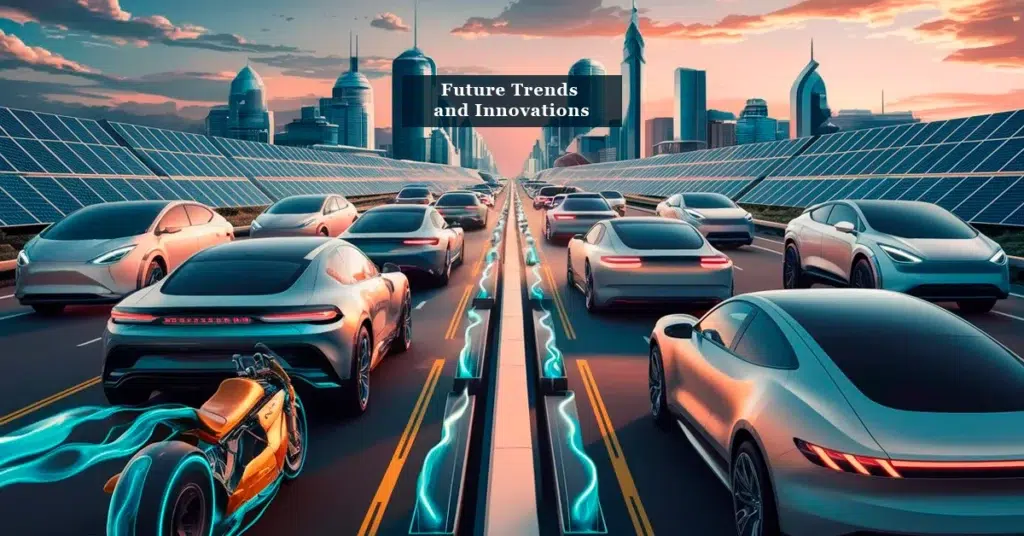
The future landscape of the EV market is poised for exponential growth.
Emerging AI Technologies
Quantum Computing in Manufacturing
Quantum computing represents a groundbreaking leap forward in the realm of manufacturing. The integration of quantum computing introduces unparalleled processing power, enabling complex calculations and simulations at unprecedented speeds. Manufacturers can harness this technology to optimise production processes, enhance efficiency, and drive innovation across the industry.
Edge AI for Real-time Processing
The advent of Edge AI heralds a new era of real-time data processing in manufacturing. By deploying AI algorithms directly on devices at the network edge, manufacturers can achieve instantaneous insights and decision-making capabilities. This approach streamlines operations, reduces latency, and empowers autonomous systems to operate with heightened efficiency.
Long-term Impact on the EV Industry
Market Growth Projections
The future landscape of the electric vehicle industry is poised for exponential growth. Market analysts project a substantial increase in demand for Electric Vehicles, driven by evolving consumer preferences, government incentives, and environmental consciousness. As advancements in technology continue to unfold, the market for electric vehicles is set to expand rapidly, reshaping the automotive sector.
Evolution of Manufacturing Practices
The evolution of manufacturing practices within the electric vehicle industry mirrors a transformative journey towards sustainability and innovation. With a strong emphasis on eco-friendly initiatives, streamlined processes, and enhanced technological integration, manufacturers are paving the way for a greener future. The adoption of AI-driven solutions is revolutionising traditional manufacturing approaches, leading to more efficient production methods and superior product quality.
Future Thoughts in EVs
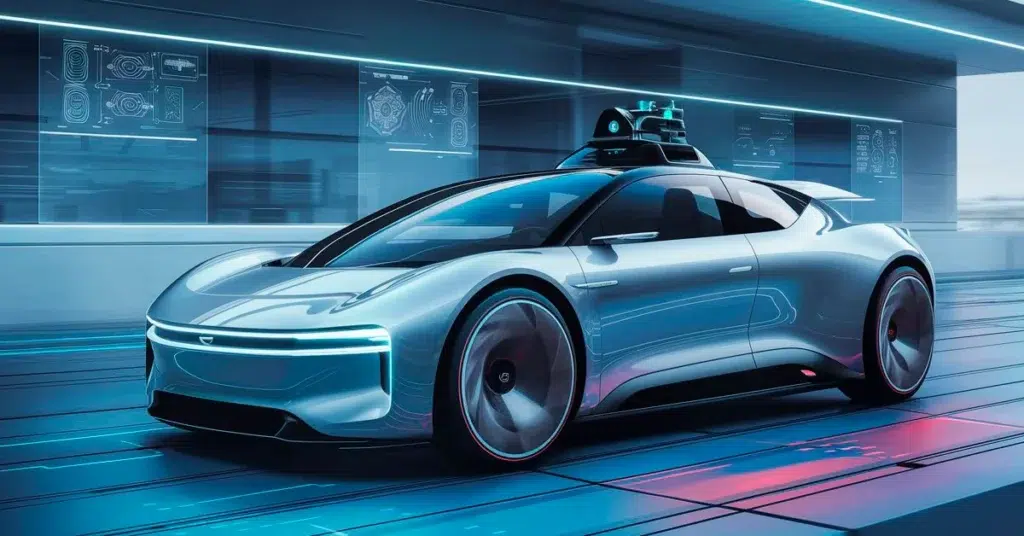
Summarising the advancements in AI in electric vehicle EV manufacturing, the industry witnesses a revolution with cutting-edge technologies. The transformative impact of AI on electric vehicles is profound, enhancing efficiency and quality control. Looking ahead, the future holds exciting prospects for further innovation and development. Integrating AI into EV manufacturing not only ensures sustainable practices but also paves the way for safer and more efficient autonomous electric vehicles. The journey of AI in EV manufacturing is a testament to progress and sustainability.





